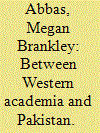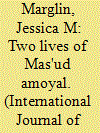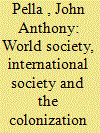| Srl | Item |
| 1 |
ID:
153585


|
|
|
|
|
| Summary/Abstract |
In the wake of European colonization, Muslims across the globe have wrestled with the problem of intellectual dualism, or the bifurcation of knowledge into the distinct Islamic and modern Western spheres. This article examines the career of Pakistani intellectual and University of Chicago professor, Fazlur Rahman (1919–1988), who emerged as a particularly significant figure in this debate over intellectual dualism in the latter half of the twentieth century. Arguing that academic methodologies were integral for Muslim understandings of Islam, Rahman broke down the dichotomy between Western and Islamic knowledge in favour of a merging of the two, an approach I term ‘fusionism’. He propagated this fusionist vision, with mixed success, in his native Pakistan and across the Islamic world. In his position as a respected professor at the University of Chicago, Rahman furthermore re-imagined and utilized the Western university as a valuable space for modern Islamic thought, thereby challenging any sharp boundary between the two discourses and their respective institutions.
|
|
|
|
|
|
|
|
|
|
|
|
|
|
|
|
| 2 |
ID:
128185


|
|
|
|
|
| Publication |
2014.
|
| Summary/Abstract |
Etymologically 'diaspora' means any people or ethnic population forced or induced to leave their traditional homelands; being dispersed throughout other parts of the world, and the ensuing developments in their dispersal and culture. Historically, the terms 'diaspora' was initially uses by the ancient Greeks to refer to citizen of grand city who migrated to a conquered land with the purpose of colonization to assimilate the territory into the empire. The original meaning was cut off from the present meaning when the old testament was translated to Greek: the word diaspora was used to refer specifically to the populations of Jews exiled from Judea in 586 B C by the Babylonians, and Jerusalem in 136 AD by the Roman empire.
|
|
|
|
|
|
|
|
|
|
|
|
|
|
|
|
| 3 |
ID:
118796


|
|
|
|
|
| Publication |
2012.
|
| Summary/Abstract |
After France's 1830 invasion of Algeria, Algerians residing outside of the new French colony could potentially be considered French subjects. A number of Moroccans, eager to partake of the legal and financial advantages of foreign nationality, crossed the border into Algeria and obtained documentation falsely attesting to their Algerian origins; they then returned to Morocco, where they convinced French consular authorities to register them as French subjects. This article uses the story of one such pseudo-Algerian, Mas?ud Amoyal, to explore the phenomenon of Moroccans who assumed the legal identities of Algerians. In Morocco and elsewhere in the Middle East, the responses of individuals like Amoyal to new legal categories created by European colonization point to the importance of expanding colonial historiography beyond the borders of imperial states. Examining the strategies of pseudo-Algerians in Morocco demonstrates the value of a transnational approach for understanding the full impact of European imperialism.
|
|
|
|
|
|
|
|
|
|
|
|
|
|
|
|
| 4 |
ID:
139004


|
|
|
|
|
| Summary/Abstract |
This article utilizes an English School approach to examine the European colonization of Africa between 1871 and 1908. Drawing upon Clark's framework for understanding the relationship between world society, international society and international institutions, it argues that the colonization of Africa was very much dependent upon the activity of non-state actors who essentially pushed European states into the formal colonization of the African interior. Such a case sheds important light on the destructive role world society has played in international politics, a topic which has received no attention in the English School literature. Moreover the study provides additional empirical insights into the relationship between world society, international society and international institutions, while also bringing much needed empirical discussion of colonization into the English School catalogue.
|
|
|
|
|
|
|
|
|
|
|
|
|
|
|
|